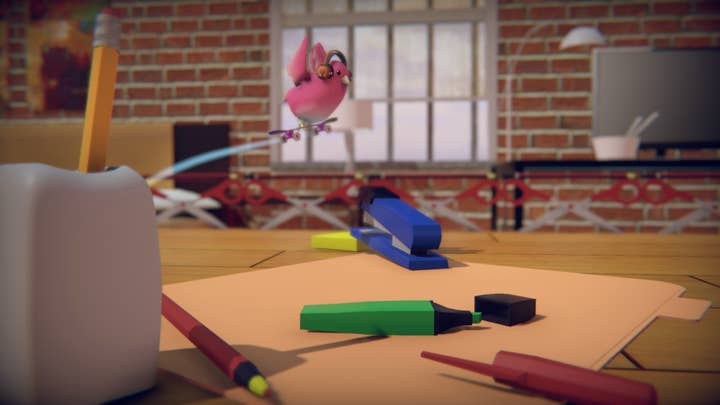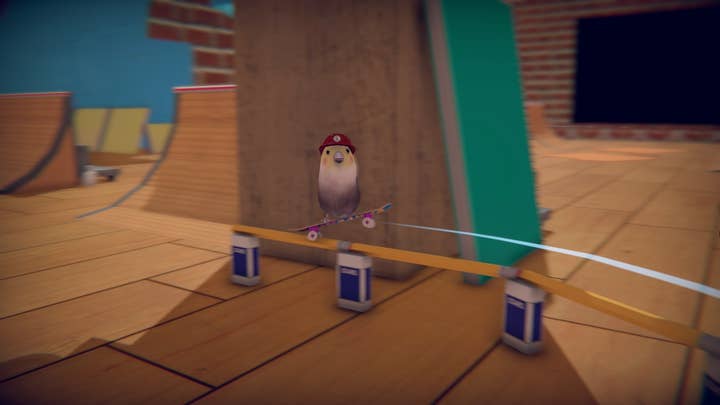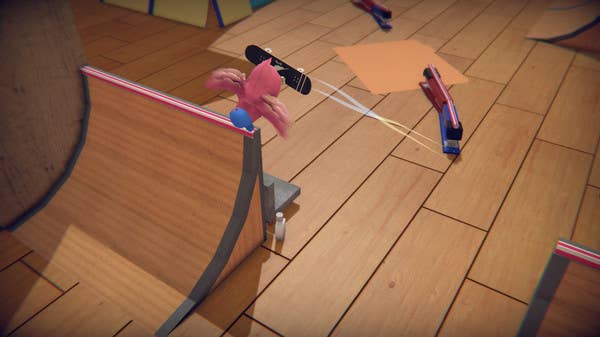Glass Bottom Games on taking "the biggest possible swing" with Skatebird
Megan Fox discusses launching a Kickstarter during E3, being in the Kinda Funny Games Showcase, and "hedging against failure"
Skatebird is an indie game about tiny, cute birds doing wild skateboarding tricks in a miniscule skate park. Sometimes, they nail those tricks to adorable and hilarious effect.
Other times, they crash and burn, but true to both any skateboarding game and Skatebird's philosophy of "birbs who try their best," they don't give up. It's an apt metaphor for Glass Bottom Games founder and Skatebird creator Megan Fox, who similarly didn't give up when her previous title, Spartan Fist, didn't sell well. Instead, she took her idea for Skatebird, and (to pull an analogy from the wrong sport), swung for the fences.
Fox launched a Kickstarter campaign for Skatebird right in the middle of E3 2019 early last month, and the campaign has almost wrapped up. At the time of this publication, it's made over $50,000 in funding -- well over its $20,000 goal, and has met multiple additional funding incentives. And while Fox acknowledges a number of factors, including her ongoing marketing approach, as factors in its success, she says a large amount of credit is due to the Kinda Funny Games Showcase at E3, and the opportunity it afforded her as an indie developer.
"We said, 'Fuck it, let's just take the biggest swing we possibly can," and, well, we did"
The Kinda Funny Games Showcase at E3 was a new game announcement showcase in 2019, run by YouTube personality Greg Miller. It began, for Fox, with a tweet months before E3 asking for indies to submit their games for inclusion in the event. Fox didn't think too much of it at the time, and hadn't even fully committed to either running a Kickstarter for Skatebird or trying to put together a publishing deal.
But when she heard that the game would receive a full-on trailer and spotlight during the show, she decided to go all-in.
"We said, 'Fuck it, let's just take the biggest swing we possibly can," and, well, we did," she says. "It's the biggest swing I've ever taken as just myself - there's a full team involved of course - but without being supported by a publisher or a platform by even a funding party. Just me, it's the biggest swing I've ever done. And it hit."
Aside from wide visibility Skatebird received during the showcase, one other major piece of publicity that helped bolster her game's Kickstarter was a piece in The Star, with the headline, "Cyberpunk 2077 rules, Skatebird flutters into sight."
"The Star is just a regular news site, and their E3 coverage was just one main story and their takeaway was that the two biggest games were Cyberpunk 2077 and Skatebird," Fox says. "Holy shit, man! It wasn't even a throwaway! I would have been over the moon with a throwaway mention in that story, like 'Cyberpunk 2077 - paragraphs paragraphs paragraphs - oh, there was also Skatebird, and that was cute.' But we got equal coverage. We had as much wording, equal space in the story. They didn't even link Cyberpunk. We got a link to the Kickstarter.

"And if you look at our [Steam] Wishlists graph, it was doing fine before, and then [during E3] the graph just goes straight up. Wishlists can be used with some accuracy to [predict sales in launch week], and then with less accuracy years from launch. So just to see that explode out of nowhere, to go from, 'It's a cute little thing, I think it'll make back the money' to 'Holy shit'...well, that's the takeaway."
While E3 has no shortage of indies in spaces like Microsoft's Xbox press event and a handful of indie showcases on the floor, the Kinda Funny Showcase was different. Fox says the wide open nature of Miller's call for game submissions gave indies a space to be present at E3 via a path that hadn't been open to them before.
"If I want to get [Skatebird] big, I can just follow how it does at launch instead of using this to get dollar signs in my eyes"
"I can buy a booth on the floor of E3, but it's priced for AAA, which means I can't fucking afford it, and even if I did, the people at E3 are not there to see tiny skateboarding birds. They're there to see Cyberpunk 2077. If you're going to go to E3 as an indie, the way to do it is by being in one of the platform showcases. If you have a game submitted to Xbox and you've signed all the appropriate agreements, you then submit to be part of their E3, and they look at who submits and go, 'Hey, there's some people we can do a thing for,' and based on that you might get in there.
"The process to get into something like Ubisoft is similar except you have to be published by Ubisoft, and to get into the PC Games showcase you're usually being published by someone else who happens to know the people who run that showcase. There are ways of getting into E3, but they're all these labyrinthine, backroom things that depend on knowing the right person, having a publisher, or working with a platform. But [Kinda Funny] was something I could do.
"Microsoft has recently done a very good job of showcasing indies, even this year, there were tons of indies at the Microsoft showcase. It's not that Kinda Funny Games was the first time an indie could ever have a shot, but it's one of the first times an indie had a shot going to E3 without that apparatus of a publisher or platform partner."
Skatebird's Kickstarter success was a pleasant surprise for Fox, and an extra influx of cash is the kind of unexpected windfall that could cause a studio or developer to get over-ambitious, particularly when it comes to adding stretch goals. But Fox says she hasn't changed anything about her plans for the game based on the attention it got around E3 and the Kickstarter.

"Another studio in my position might take this as a sign that Skatebird needs to scale up and start promising things like multiplayer, or we might say we have to bump the date forward another year because we want to have time to scale the game," she says. "But I don't think more things would help the game sell better at this point. If I want the game to do as well as it's going to do, I just have to make the game as good as possible - small, cute, contained, well-developed. If I start trying to glue shit onto it, I don't think it's going to magically do numbers. It's more important to keep it small and focused and not try to scale.
"If Skatebird does blow up, good, then maybe I can do add-ons and expand it after launch. I don't mean early access, just supporting the game after it comes out. If I want to get it big, I can just follow how it does at launch instead of using this to get dollar signs in my eyes. A lot of people do that and it works for them, I've also seen it blow up in faces."
"You're hedging against failure. You don't know how many of these things will play out, so you have to try them all and see what works"
That careful planning extends to the game's stretch goals -- even though said goals have been visibly added as the Kickstarter reached milestones, all the incentives were ideas Fox had considered to be in the realm of possibility even on a budget on $20,000.
"A lot of people, when they think of stretch goals, they start tacking on crazier and crazier shit that they had never thought about before, and that's where Kickstarters go bad," she says. "'I'm going to promise multiplayer even though I've never made a multiplayer game or have any idea how to architect its systems,' and things like that. Everything I'm promising is things that were either already planned and I just wasn't quite sure we were going to have time to put them in, or they were things I had said I'd really like, but wasn't sure we would do it.
"To be clear, the stretch goals are not things guaranteed at launch. Some will actually come later, because we want to have a good launch and finish the game, as opposed to adding on another year to add more content."
The success of Skatebird's Kickstarter has been a learning opportunity for Fox, who says she found it helpful to see things like Wishlist and engagement metrics for a game that, as things stand now, seems like it will be a success. She's taking lessons from the "home run" she hit, but also acknowledges that not only does luck play a huge factor in indie games getting attention, but also that the market is constantly in flux.
"Tanya Short [Kit Fox Games] got me talking about marketing-first development, which is the thing where as soon as you have a kernel of anything that you think is a sellable prototype, ask yourself, 'Who is going to buy this? How are you going to get it in front of them? How are you going to turn it into something they are going to buy?' Answer those questions first, which is a long way of saying, 'Do a vertical slice.'
"With Skatebird, the first thing I did was that as soon as I had a prototype that seemed fun, I took it to enough of a polish that I was certain I could sell it. The initial response was good, because I had done that first. Then I did a lot of community building based on gif posting generally being available [to the community] and so forth. But all of these things are just hedges. You're hedging against failure. You don't know how many of these things will play out, so you have to try them all and see what works.
"At some point, Twitter might to die off. The gif thing might die. Everything you do is going to change. You can't guarantee success. All you can really do is hedge against failure using whatever tools are available to the best of your ability. If there's anything I can do moving forward, it's mostly that I've seen trends go right once, which is useful. With Spartan Fist, I saw Wishlisting behavior six months out that should have told me the game was going to be a flop. At that point, what I should have done was put the brakes on. Simplify what I had, gotten it out the door ASAP. Instead, I doubled down, which was super dumb. With Skatebird, I have enough metrics and experience to see what the game might look like. Hopefully it's a success."









